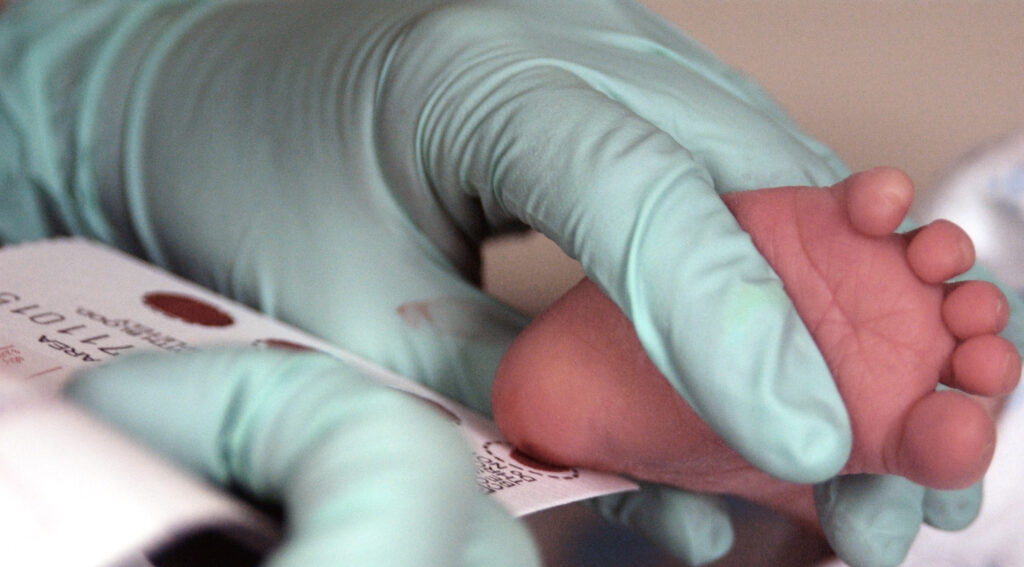The newborn screening test is performed before your baby leaves the hospital. These screening tests can detect serious health conditions in your baby. They check for certain genetic or metabolic conditions, hearing loss and specific heart problems.
The baby may not experience symptoms immediately even if he or she is born with one of these conditions. If not treated, the baby may develop serious problems later on in life. The newborn screening is a way to identify these babies early and allow for treatment to begin as soon as possible.

Newborn Screening: Its Various Important Aspects
A lot of babies across the globe are subjected to newborn screening. Each country determines which conditions they will screen for in newborns born there. Also, in some countries, these tests are not available.
The various components of Newborn Screening—
There are three components to newborn screening:
Heel Stick—
A few drops from the baby’s heel are taken when the baby is between 12 and 48 hours old. This is known to be the heel stick test. The blood is usually transferred to a small card and sent to the laboratory.
Pulse Oximetry—
A sensor is placed on the skin of babies who are at least 24hrs old. This sensor is known as the pulse oximeter. It does not harm the baby and is completely painless. The pulse oximeter is used to measure the amount of oxygen in the baby’s blood. Critical Congenital Heart Defects can be one problem your baby might be suffering from if the oximeter shows a low oxygen level in its reading.
Hearing Screen—
A hearing screen can be performed at any age, starting from when the baby is approximately 12 hours old. There are two options for screening the hearing. Both assess how well the baby responds with sounds and are often painless and quick. The hearing screen is usually done while the infant is asleep.
Significance of newborn screening—
Newborn screening can help identify babies who are suffering from serious medical conditions. These babies usually look healthy and normal right from birth. They don’t usually show symptoms until a few months or weeks later. It is possible to detect these babies early on with newborn screening tests. Early treatment can prevent serious consequences such as death, intellectual disabilities, or illness.
What does the procedure involve?
The heel of the baby is pricked, and a small amount of blood is drawn. This is undertaken before the hospital discharges the mother and the baby. It usually happens within a day or two of the birth of the baby. If you did not deliver the baby in a hospital, you would need to speak to a doctor about newborn screening and how you can get it done.
Collection of blood samples should be undertaken after 24 hours of the baby’s birth. However, some tests are done within 24 hours, as mothers and babies are released the same day, sometimes. When the initial blood sample is taken before 24 hours of the baby’s birth, experts recommend another sample to be taken no later than 1- 2 weeks. Note that in some places, 2 tests are conducted as a routine.
How long does it take for the results to come out?
As soon as the test has been completed, the results are made available.
To be more precise, blood tests results are available by the time a baby turns seven days old. Often when the screening tests are normal, parents aren’t contacted for the results. It’s only when the screening test shows a positive result for a health issue that parents are contacted. A positive result does not necessarily mean that the child has a particular health problem. Doctors may order additional tests in order to rule out or confirm the initial diagnosis.
If additional tests confirm the initial diagnosis, doctors may refer the child or their family to a specialist. The specialist then might order more testing for treatment. It’s important that you start treatment as soon as possible. The baby might require special formula, medication, or diet restrictions as per the diagnosis. Close monitoring of the baby may also be needed.
What does it mean to have positive newborn screening test results?
It is important to understand that newborn screening is only a screening test. A newborn screening test does not necessarily mean your baby is diagnosed with the condition. It simply means that you need to do more testing.
Newborn screening is simply meant for babies who may have a condition. These babies will need to be subjected to more tests to confirm their condition.
Can a woman who decides to give birth at home or outside of a hospital go for this screening?
Even if you decide not to give birth in a hospital, you can still get the newborn screening test done. Discuss with your doctor or your midwife how you can get all three parts of this newborn screening test completed.
Although newborn screening can be extremely helpful in making sure a baby is born without serious health conditions, the decision regarding whether to get it done or not depends entirely on the mother.







Leave a Comment
You must be logged in to post a comment.